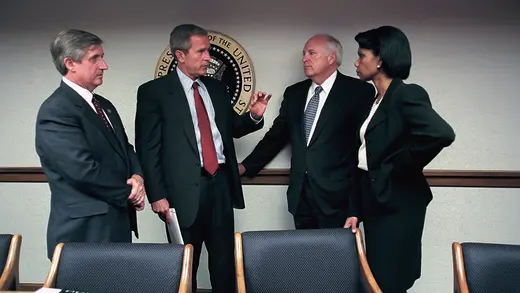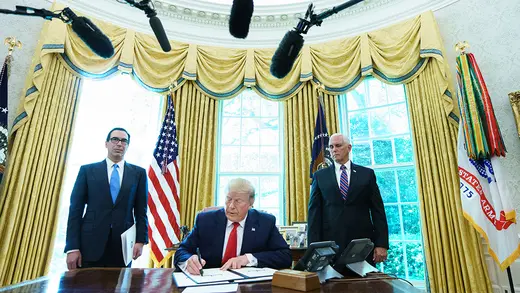Why Iran Tensions Are Rekindling the AUMF Debate
A look at the post-9/11 war powers law that the Trump administration could use to justify conflict with Iran.
By experts and staff
- Published
By
- Zachary LaubSenior Copy Editor/Writer
Three successive presidents have relied on the post-9/11 Authorization for Use of Military Force (AUMF) to justify military operations around the world. Some members of Congress are now chafing at the Trump administration’s assertion that it could apply to Iran as well.
What’s the situation?
Tensions between Iran and the United States have reached new heights in recent months. The United States renewed oil sanctions after withdrawing from the 2015 nuclear agreement, and Iran countered by resuming its nuclear activities. Meanwhile, in the Strait of Hormuz, the United States has dispatched warships to protect oil shipping in the wake of the sabotage of tankers it has linked to Iran.
Amid this brinkmanship, the Trump administration has briefed Congress on ostensible ties between the Islamic Republic and al-Qaeda. Many experts are skeptical of these claims, and some lawmakers worry that the administration is trying to establish that it already has all the congressional authorization it would need to go to war with Iran.
What is the AUMF?

Congress passed the 2001 AUMF just three days after September 11, before there was much clarity on the attacks. The operative portion is just sixty words long:
That the President is authorized to use all necessary and appropriate force against those nations, organizations, or persons he determines planned, authorized, committed, or aided the terrorist attacks that occurred on September 11, 2001, or harbored such organizations or persons in order to prevent any future acts of international terrorism against the United States by such nations, organizations or persons.
At least as significant as what the measure does say is what it doesn’t: it has no parameters on time or space.
In practice, this has allowed presidents to avoid getting explicit permission from Congress for military actions—a requirement of the U.S. Constitution and the 1973 War Powers Resolution [PDF]—as long as their missions can be related back to al-Qaeda.
What’s the objection?
Opponents have warned that the legislation is a blank check. Representative Barbara Lee cast the lone dissenting vote in 2001, but many more members of Congress have turned against the AUMF as the full scope of operations carried out under it have become clearer.

President George W. Bush first put it to use in his “war on terror,” which he said wouldn’t end until “every terrorist group of global reach” was defeated. A U.S.-led coalition invaded Afghanistan in late 2001, after the Taliban refused to hand over al-Qaeda leader Osama bin Laden. Nearly eighteen years later, the Trump administration is negotiating with the Taliban to end what has become the United States’ longest war.
In the intervening years, the AUMF has been used to justify U.S. military operations across Africa, the Middle East, and South Asia. Presidents Obama and Trump have applied it to the campaign against the self-proclaimed Islamic State in Iraq, Syria, and elsewhere, even though the group came into being only after the 2003 invasion of Iraq and has since split with al-Qaeda. By 2017–18, U.S. troops were involved in combat in at least fourteen countries and conducting air strikes in seven, including Somalia and Yemen.
The AUMF also underlies the prison camp at Guantanamo Bay. Supreme Court Justice Stephen Breyer is among those who have questioned the constitutionality of detaining the forty prisoners of war who remain there indefinitely, while the military is now preparing to offer end-of-life care.
What are the alternatives?
Despite congressional discontent, attempts to repeal the 2001 AUMF have faltered over disagreement on what should replace it.
Some lawmakers want to provide more explicit legal authority for the wide array of U.S. counterterrorism operations already underway; others seek to rein these operations in. Among the major issues are whether a new law should specify an expiration date, place limits on its geographical scope, or identify specific groups to be targeted.
Lawmakers have often been content to duck the issue altogether. Many members of Congress are wary of looking weak on national security and don’t want to tie the president’s hands. They also don’t want to go on record with risky votes on matters of war and peace, political scientist Elizabeth N. Saunders has observed.
But the risk of escalation with Iran has given many lawmakers the impetus to impose some restraints. Last week, a bipartisan measure to prohibit defense funds from being spent on war with Iran without prior congressional authorization fell short of the sixty votes needed in the Senate. The House will consider the same measure in its version of the defense spending bill. Meanwhile, Representative Lee is still pushing for the AUMF’s outright repeal. Given the Senate’s leadership and Trump’s veto power, however, the status quo will likely persist.